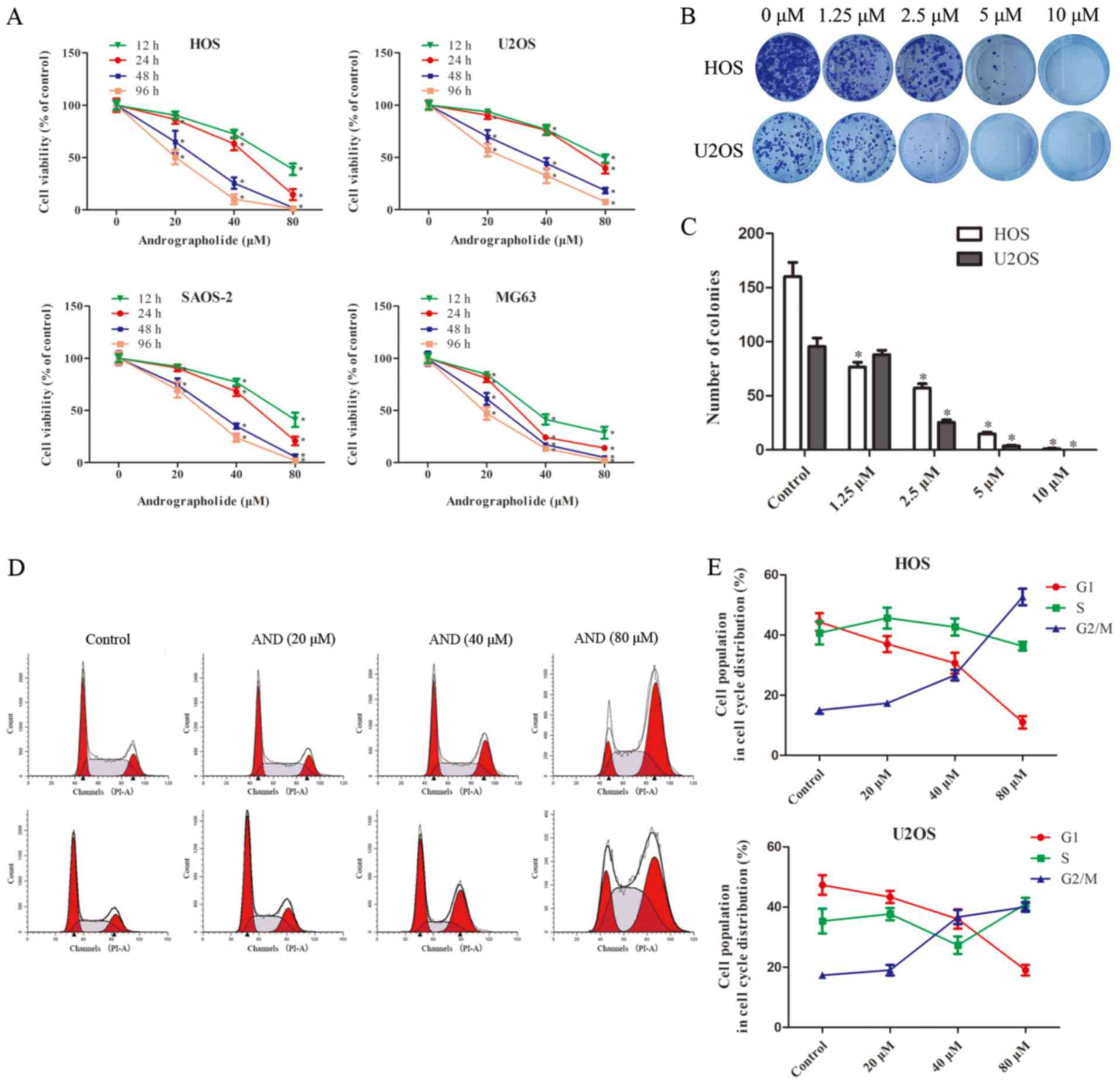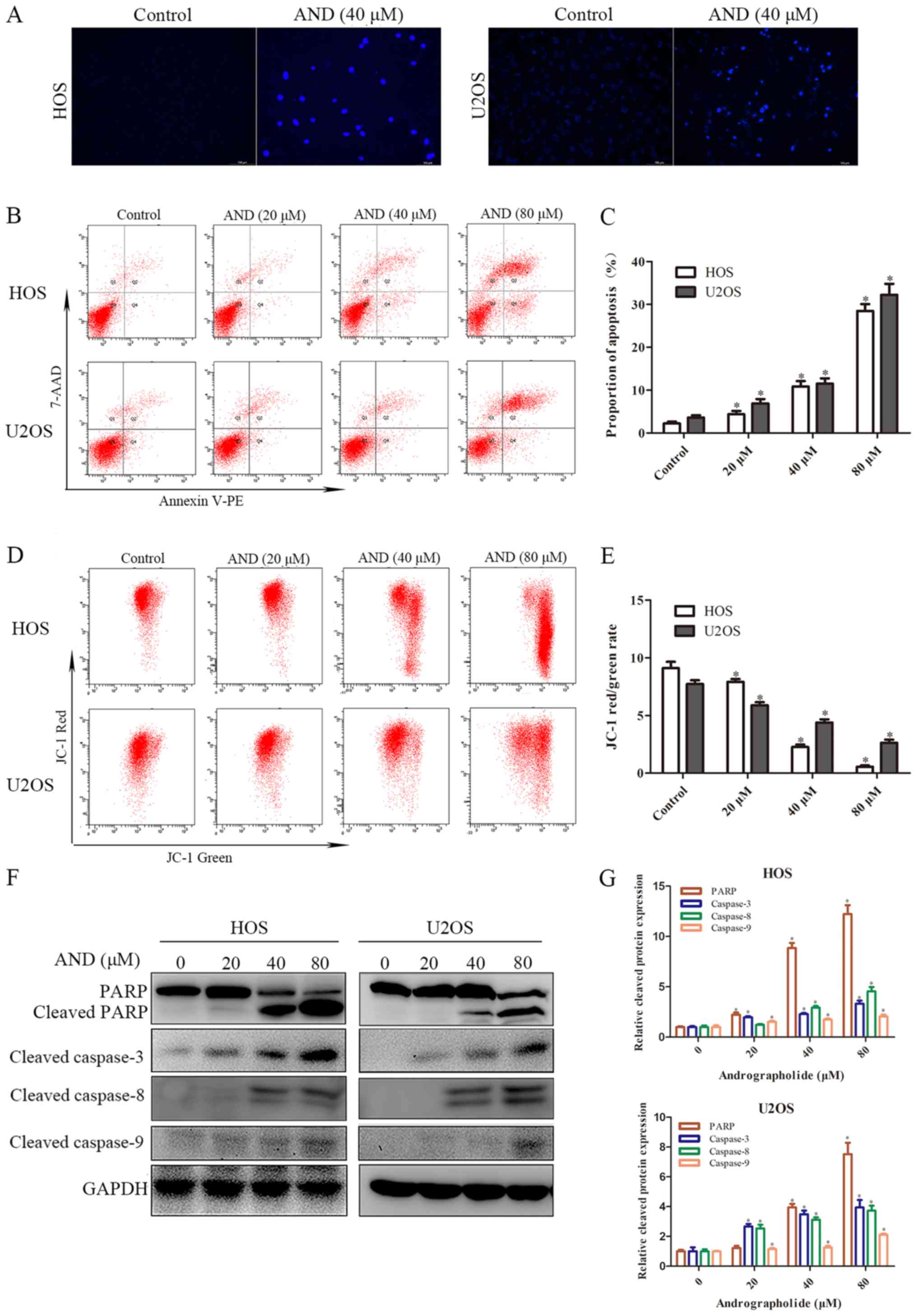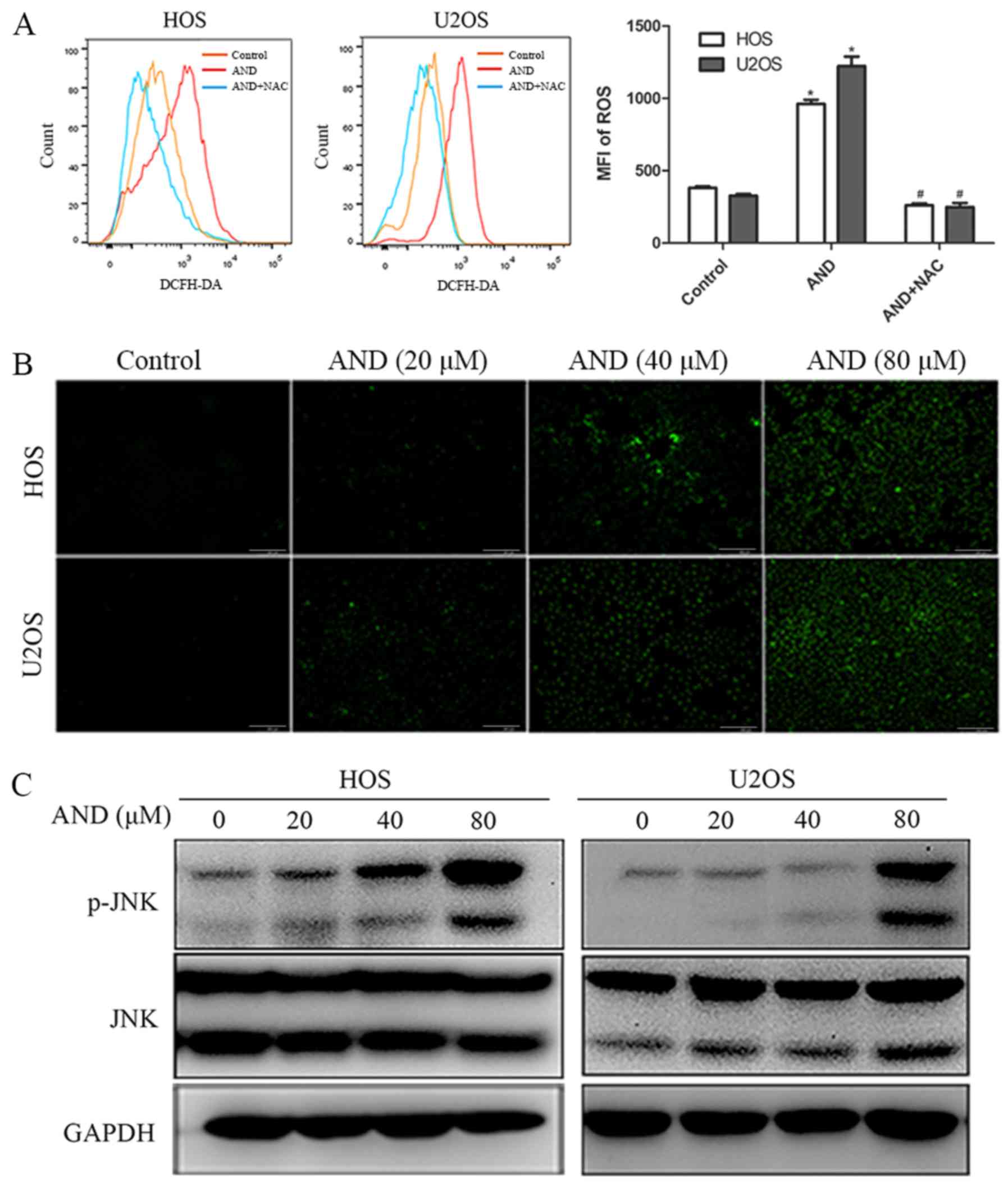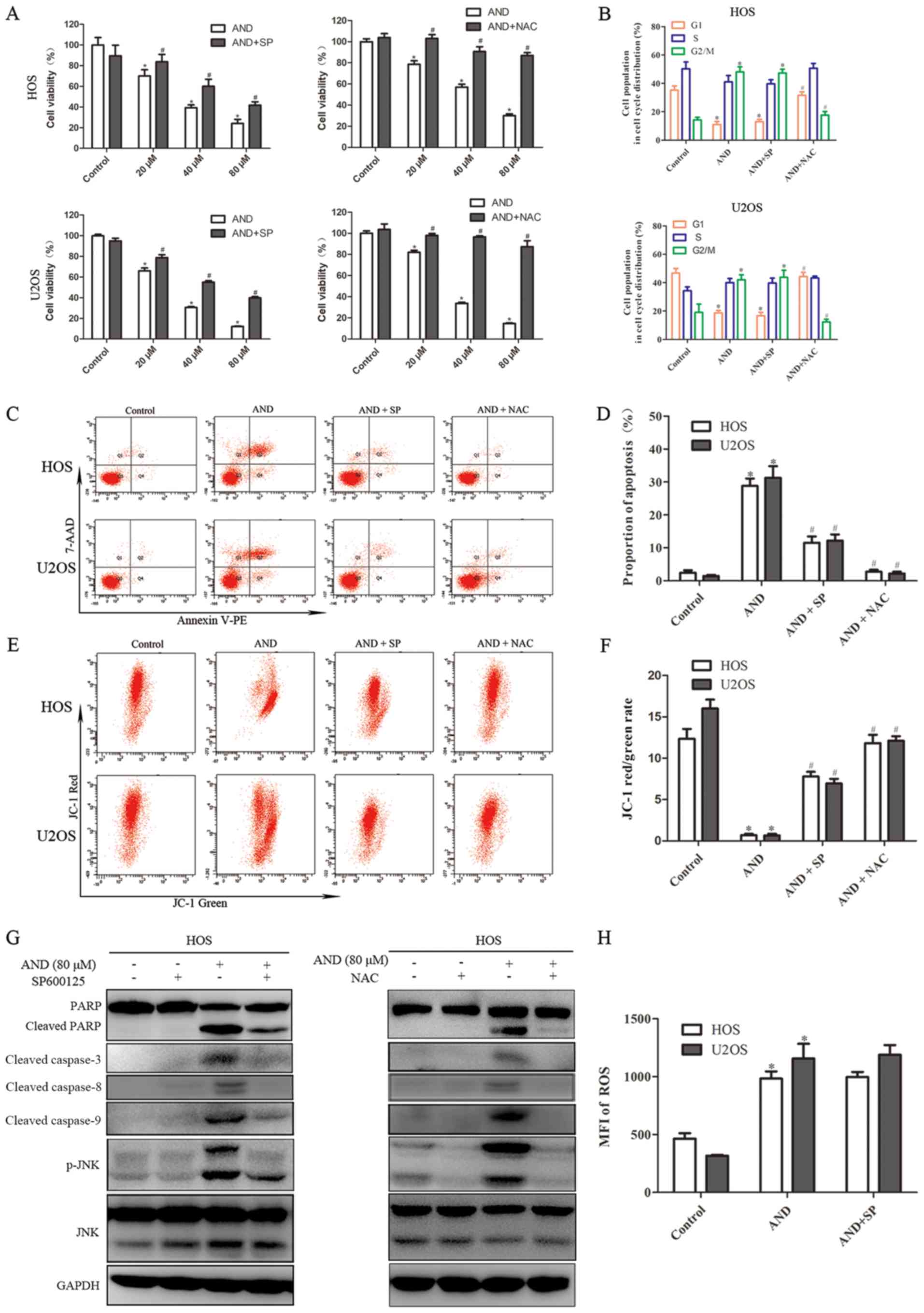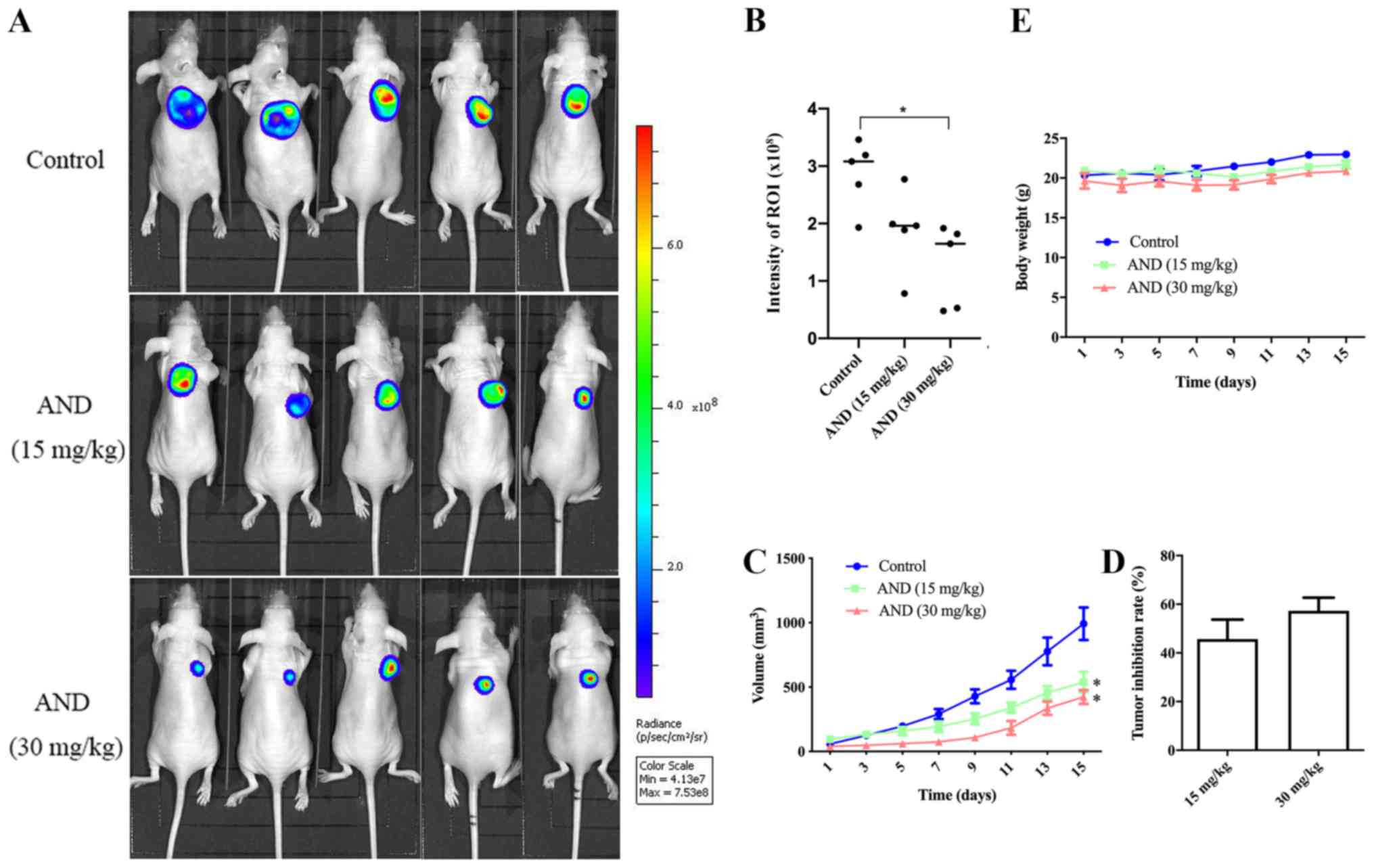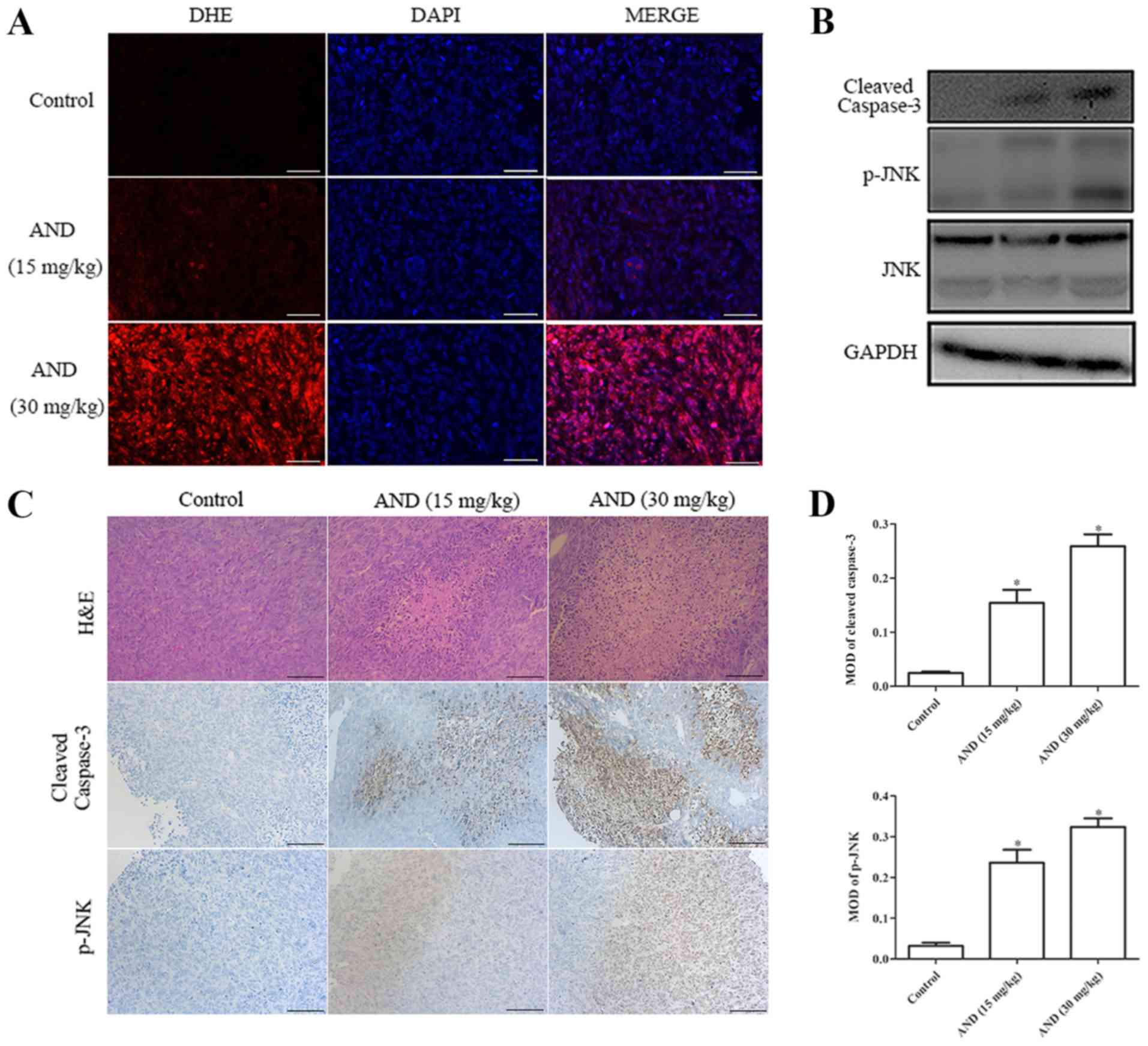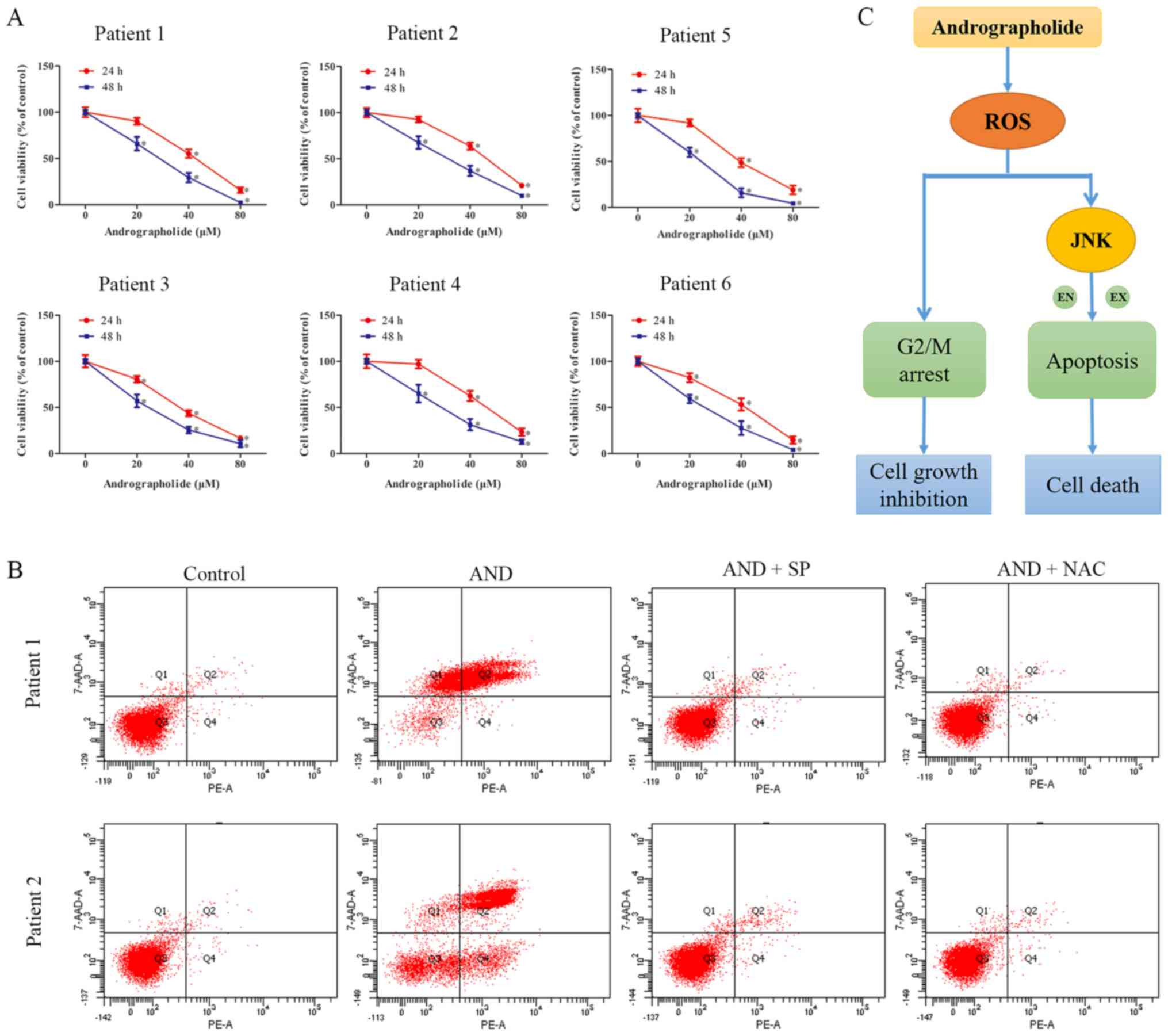|
1
|
Agarwal M, Anchan C, Shah M, Puri A and
Pai S: Limb salvage surgery for osteosarcoma: Effective low-cost
treatment. Clin Orthop Relat Res. 459:82–91. 2007. View Article : Google Scholar : PubMed/NCBI
|
|
2
|
Biermann JS, Adkins DR, Benjamin RS,
Brigman B, Chow W, Conrad EU III, Frassica DA, Frassica FJ, George
S, Hande KR, et al: National Comprehensive Cancer Network Bone
Cancer Panel: Bone cancer. J Natl Compr Canc Netw. 8:688–712. 2010.
View Article : Google Scholar : PubMed/NCBI
|
|
3
|
Ando K, Heymann MF, Stresing V, Mori K,
Rédini F and Heymann D: Current therapeutic strategies and novel
approaches in osteosarcoma. Cancers (Basel). 5:591–616. 2013.
View Article : Google Scholar
|
|
4
|
Harrison DJ, Geller DS, Gill JD, Lewis VO
and Gorlick R: Current and future therapeutic approaches for
osteosarcoma. Expert Rev Anticancer Ther. 18:39–50. 2018.
View Article : Google Scholar
|
|
5
|
Bielack S, Carrle D and Casali PG; ESMO
Guidelines Working Group: Osteosarcoma: ESMO clinical
recommendations for diagnosis, treatment and follow-up. Ann Oncol.
20(Suppl 4): 137–139. 2009. View Article : Google Scholar : PubMed/NCBI
|
|
6
|
Durfee RA, Mohammed M and Luu HH: Review
of Osteosarcoma and Current Management. Rheumatol Ther. 3:221–243.
2016. View Article : Google Scholar : PubMed/NCBI
|
|
7
|
Cassileth BR and Deng G: Complementary and
alternative therapies for cancer. Oncologist. 9:80–89. 2004.
View Article : Google Scholar : PubMed/NCBI
|
|
8
|
Kaur R, Kapoor K and Kaur H: Plants as a
source of anticancer agents. J Nat Prod Plant Resour. 1:119–124.
2011.
|
|
9
|
Mayzlish-Gati E, Fridlender M, Nallathambi
R, Selvaraj G, Nadarajan S and Koltai H: Review on Anti-Cancer
Activity in Wild Plants of the Middle East. Curr Med Chem.
25:4656–4670. 2018. View Article : Google Scholar
|
|
10
|
Lim JCW, Chan TK, Ng DS, Sagineedu SR,
Stanslas J and Wong WS: Andrographolide and its analogues:
Versatile bioactive molecules for combating inflammation and
cancer. Clin Exp Pharmacol Physiol. 39:300–310. 2012. View Article : Google Scholar
|
|
11
|
Islam MT, Ali ES, Uddin SJ, Islam MA, Shaw
S, Khan IN, Saravi SSS, Ahmad S, Rehman S, Gupta VK, et al:
Andrographolide, a diterpene lactone from Andrographis paniculata
and its therapeutic promises in cancer. Cancer Lett. 420:129–145.
2018. View Article : Google Scholar : PubMed/NCBI
|
|
12
|
Pratheeshkumar P, Sheeja K and Kuttan G:
Andrographolide induces apoptosis in B16F-10 melanoma cells by
inhibiting NF-κ B-mediated bcl-2 activation and modulating
p53-induced caspase-3 gene expression. Immunopharmacol
Immunotoxicol. 34:143–151. 2012. View Article : Google Scholar
|
|
13
|
Huang K, Chen Y, Zhang R, Wu Y, Ma Y, Fang
X and Shen S: Honokiol induces apoptosis and autophagy via the
ROS/ERK1/2 signaling pathway in human osteosarcoma cells in vitro
and in vivo. Cell Death Dis. 9:1572018. View Article : Google Scholar : PubMed/NCBI
|
|
14
|
Zhou J, Zhang S, Ong CN and Shen HM:
Critical role of pro-apoptotic Bcl-2 family members in
andrographolide-induced apoptosis in human cancer cells. Biochem
Pharmacol. 72:132–144. 2006. View Article : Google Scholar : PubMed/NCBI
|
|
15
|
Cheung HY, Cheung SH, Li J, Cheung CS, Lai
WP, Fong WF and Leung FM: Andrographolide isolated from
Andrographis paniculata induces cell cycle arrest and
mitochondrial-mediated apoptosis in human leukemic HL-60 cells.
Planta Med. 71:1106–1111. 2005. View Article : Google Scholar
|
|
16
|
Wong HC, Wong CC, Sagineedu SR, Loke SC,
Lajis NH and Stanslas J: SRJ23, a new semisynthetic andrographolide
derivative: In vitro growth inhibition and mechanisms of cell cycle
arrest and apoptosis in prostate cancer cells. Cell Biol Toxicol.
30:269–288. 2014. View Article : Google Scholar : PubMed/NCBI
|
|
17
|
Burgess DJ: Apoptosis: Refined and lethal.
Nat Rev Cancer. 13:792013. View
Article : Google Scholar : PubMed/NCBI
|
|
18
|
Zimmermann KC, Bonzon C and Green DR: The
machinery of programmed cell death. Pharmacol Ther. 92:57–70. 2001.
View Article : Google Scholar : PubMed/NCBI
|
|
19
|
Fruehauf JP and Meyskens FL Jr: Reactive
oxygen species: A breath of life or death? Clin Cancer Res.
13:789–794. 2007. View Article : Google Scholar : PubMed/NCBI
|
|
20
|
Pelicano H, Carney D and Huang P: ROS
stress in cancer cells and therapeutic implications. Drug Resist
Updat. 7:97–110. 2004. View Article : Google Scholar : PubMed/NCBI
|
|
21
|
Wang G, Zhang T, Sun W, Wang H, Yin F,
Wang Z, Zuo D, Sun M, Zhou Z, Lin B, et al: Arsenic sulfide induces
apoptosis and autophagy through the activation of ROS/JNK and
suppression of Akt/mTOR signaling pathways in osteosarcoma. Free
Radic Biol Med. 106:24–37. 2017. View Article : Google Scholar : PubMed/NCBI
|
|
22
|
Smolensky D, Rhodes D, McVey DS, Fawver Z,
Perumal R, Herald T and Noronha L: High-Polyphenol Sorghum Bran
Extract Inhibits Cancer Cell Growth Through ROS Induction, Cell
Cycle Arrest, and Apoptosis. J Med Food. 21:990–998. 2018.
View Article : Google Scholar : PubMed/NCBI
|
|
23
|
Li H-Y, Zhang J, Sun L-L, Li BH, Gao HL,
Xie T, Zhang N and Ye ZM: Celastrol induces apoptosis and autophagy
via the ROS/JNK signaling pathway in human osteosarcoma cells: An
in vitro and in vivo study. Cell Death Dis. 6:e16042015. View Article : Google Scholar : PubMed/NCBI
|
|
24
|
Jian SL, Chen WW, Su YC, Su YW, Chuang TH,
Hsu SC and Huang LR: Glycolysis regulates the expansion of
myeloid-derived suppressor cells in tumor-bearing hosts through
prevention of ROS-mediated apoptosis. Cell Death Dis. 8:e27792017.
View Article : Google Scholar : PubMed/NCBI
|
|
25
|
Zeng KW, Song FJ, Wang YH, Li N, Yu Q,
Liao LX, Jiang Y and Tu PF: Induction of hepatoma carcinoma cell
apoptosis through activation of the JNK-nicotinamide adenine
dinucleotide phosphate (NADPH) oxidase-ROS self-driven death signal
circuit. Cancer Lett. 353:220–231. 2014. View Article : Google Scholar : PubMed/NCBI
|
|
26
|
Kyriakis JM, Banerjee P, Nikolakaki E, Dai
T, Rubie EA, Ahmad MF, Avruch J and Woodgett JR: The
stress-activated protein kinase subfamily of c-Jun kinases. Nature.
369:156–160. 1994. View Article : Google Scholar : PubMed/NCBI
|
|
27
|
Banerjee M, Chattopadhyay S, Choudhuri T,
Bera R, Kumar S, Chakraborty B and Mukherjee SK: Cytotoxicity and
cell cycle arrest induced by andrographolide lead to programmed
cell death of MDA-MB-231 breast cancer cell line. J Biomed Sci.
23:402016. View Article : Google Scholar : PubMed/NCBI
|
|
28
|
Wei RJ, Zhang XS and He DL:
Andrographolide sensitizes prostate cancer cells to TRAIL-induced
apoptosis. Asian J Androl. 20:200–204. 2018. View Article : Google Scholar :
|
|
29
|
Lim SC, Jeon HJ, Kee KH, Lee MJ, Hong R
and Han SI: Andrographolide induces apoptotic and non-apoptotic
death and enhances tumor necrosis factor-related apoptosis-inducing
ligand-mediated apoptosis in gastric cancer cells. Oncol Lett.
13:3837–3844. 2017. View Article : Google Scholar : PubMed/NCBI
|
|
30
|
Mao W, He P, Wang W, Wu X and Wei C:
Andrographolide sensitizes Hep-2 human laryngeal cancer cells to
carboplatin-induced apoptosis by increasing reactive oxygen species
levels. Anticancer Drugs. 30:e07742019. View Article : Google Scholar : PubMed/NCBI
|
|
31
|
Zhou J, Lu GD, Ong CS, Ong CN and Shen HM:
Andrographolide sensitizes cancer cells to TRAIL-induced apoptosis
via p53-mediated death receptor 4 up-regulation. Mol Cancer Ther.
7:2170–2180. 2008. View Article : Google Scholar : PubMed/NCBI
|
|
32
|
Alzaharna M, Alqouqa I and Cheung HY:
Taxifolin synergizes Andrographolide-induced cell death by
attenuation of autophagy and augmentation of caspase dependent and
independent cell death in HeLa cells. PLoS One. 12:e01713252017.
View Article : Google Scholar : PubMed/NCBI
|
|
33
|
Rodríguez-Muela N, Germain F, Mariño G,
Fitze PS and Boya P: Autophagy promotes survival of retinal
ganglion cells after optic nerve axotomy in mice. Cell Death
Differ. 19:162–169. 2012. View Article : Google Scholar :
|
|
34
|
Li B, Zhu X, Sun L, Yuan L, Zhang J, Li H
and Ye Z: Induction of a specific CD8+ T-cell response to
cancer/testis antigens by demethylating pre-treatment against
osteosarcoma. Oncotarget. 5:10791–10802. 2014.PubMed/NCBI
|
|
35
|
Scherz-Shouval R and Elazar Z: Regulation
of autophagy by ROS: Physiology and pathology. Trends Biochem Sci.
36:30–38. 2011. View Article : Google Scholar
|
|
36
|
Neumann J, Yang Y, Köhler R, Giaisi M,
Witzens-Harig M, Liu D, Krammer PH, Lin W and Li-Weber M: Mangrove
dolabrane-type of diterpenes tagalsins suppresses tumor growth via
ROS-mediated apoptosis and ATM/ATR-Chk1/Chk2-regulated cell cycle
arrest. Int J Cancer. 137:2739–2748. 2015. View Article : Google Scholar : PubMed/NCBI
|
|
37
|
Kamata H, Honda S, Maeda S, Chang L,
Hirata H and Karin M: Reactive oxygen species promote
TNFalpha-induced death and sustained JNK activation by inhibiting
MAP kinase phosphatases. Cell. 120:649–661. 2005. View Article : Google Scholar : PubMed/NCBI
|
|
38
|
Isakoff MS, Bielack SS, Meltzer P and
Gorlick R: Osteosarcoma: Current Treatment and a Collaborative
Pathway to Success. J Clin Oncol. 33:3029–3035. 2015. View Article : Google Scholar : PubMed/NCBI
|
|
39
|
Deng Y, Bi R, Guo H, Yang J, Du Y, Wang C
and Wei W: Andrographolide Enhances TRAIL-Induced Apoptosis via
p53-Mediated Death Receptors Up-Regulation and Suppression of the
NF-кB Pathway in Bladder Cancer Cells. Int J Biol Sci. 15:688–700.
2019. View Article : Google Scholar :
|
|
40
|
Peng T, Hu M, Wu TT, Zhang C, Chen Z,
Huang S and Zhou XH: Andrographolide suppresses proliferation of
nasopharyngeal carcinoma cells via attenuating NF-κB pathway.
BioMed Res Int. 2015:7350562015. View Article : Google Scholar
|
|
41
|
Zhang QQ, Ding Y, Lei Y, Qi CL, He XD, Lan
T, Li JC, Gong P, Yang X, Geng JG, et al: Andrographolide suppress
tumor growth by inhibiting TLR4/NF-κB signaling activation in
insulinoma. Int J Biol Sci. 10:404–414. 2014. View Article : Google Scholar :
|
|
42
|
Peng Y, Wang Y, Tang N, Sun D, Lan Y, Yu
Z, Zhao X, Feng L, Zhang B, Jin L, et al: Andrographolide inhibits
breast cancer through suppressing COX-2 expression and angiogenesis
via inactivation of p300 signaling and VEGF pathway. J Exp Clin
Cancer Res. 37:2482018. View Article : Google Scholar : PubMed/NCBI
|
|
43
|
Cui Q, Wang JQ, Assaraf YG, Ren L, Gupta
P, Wei L, Ashby CR Jr, Yang DH and Chen ZS: Modulating ROS to
overcome multidrug resistance in cancer. Drug Resist Updat.
41:1–25. 2018. View Article : Google Scholar : PubMed/NCBI
|
|
44
|
Gupta SC, Hevia D, Patchva S, Park B, Koh
W and Aggarwal BB: Upsides and downsides of reactive oxygen species
for cancer: The roles of reactive oxygen species in tumorigenesis,
prevention, and therapy. Antioxid Redox Signal. 16:1295–1322. 2012.
View Article : Google Scholar :
|
|
45
|
Kumari S, Badana AK, G MM, G S and Malla
RR: G MM, G S and Malla R: Reactive Oxygen Species: A Key
Constituent in Cancer Survival. Biomark Insights. 13:919146892018.
View Article : Google Scholar
|
|
46
|
Nita M and Grzybowski A: The Role of the
Reactive Oxygen Species and Oxidative Stress in the Pathomechanism
of the Age-Related Ocular Diseases and Other Pathologies of the
Anterior and Posterior Eye Segments in Adults. Oxid Med Cell
Longev. 2016:31647342016. View Article : Google Scholar : PubMed/NCBI
|
|
47
|
Boonstra J and Post JA: Molecular events
associated with reactive oxygen species and cell cycle progression
in mammalian cells. Gene. 337:1–13. 2004. View Article : Google Scholar : PubMed/NCBI
|
|
48
|
Bridge G, Rashid S and Martin SA: DNA
mismatch repair and oxidative DNA damage: Implications for cancer
biology and treatment. Cancers (Basel). 6:1597–1614. 2014.
View Article : Google Scholar
|
|
49
|
Zhou G-Z, Li A-F, Sun Y-H and Sun G-C: A
novel synthetic curcumin derivative MHMM-41 induces ROS-mediated
apoptosis and migration blocking of human lung cancer cells A549.
Biomed Pharmacother. 103:391–398. 2018. View Article : Google Scholar : PubMed/NCBI
|
|
50
|
Pardhasaradhi BVV, Ali AM, Kumari AL,
Reddanna P and Khar A: Phycocyanin-mediated apoptosis in AK-5 tumor
cells involves down-regulation of Bcl-2 and generation of ROS. Mol
Cancer Ther. 2:1165–1170. 2003.PubMed/NCBI
|
|
51
|
Deeb D, Gao X, Jiang H, Janic B, Arbab AS,
Rojanasakul Y, Dulchavsky SA and Gautam SC: Oleanane triterpenoid
CDDO-Me inhibits growth and induces apoptosis in prostate cancer
cells through a ROS-dependent mechanism. Biochem Pharmacol.
79:350–360. 2010. View Article : Google Scholar
|
|
52
|
Shen HM and Liu ZG: JNK signaling pathway
is a key modulator in cell death mediated by reactive oxygen and
nitrogen species. Free Radic Biol Med. 40:928–939. 2006. View Article : Google Scholar : PubMed/NCBI
|
|
53
|
Dhanasekaran DN and Reddy EP: JNK
signaling in apoptosis. Oncogene. 27:6245–6251. 2008. View Article : Google Scholar : PubMed/NCBI
|
|
54
|
Krajarng A, Imoto M, Tashiro E, Fujimaki
T, Shinjo S and Watanapokasin R: Apoptosis induction associated
with the ER stress response through up-regulation of JNK in HeLa
cells by gambogic acid. BMC Complement Altern Med. 15:262015.
View Article : Google Scholar : PubMed/NCBI
|















